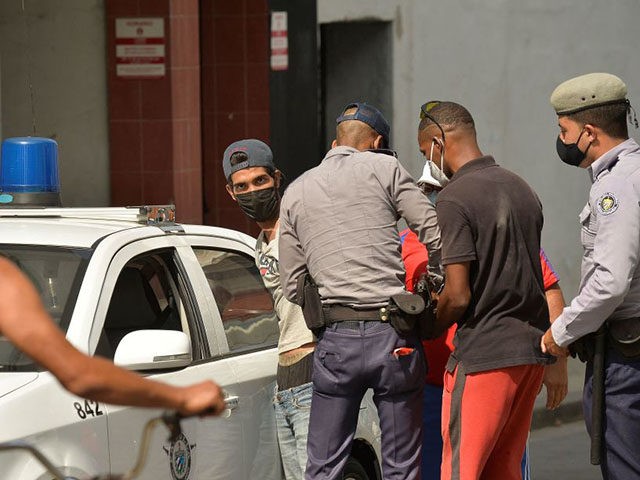The Cuban pro-democracy group Cuba Decide confirmed the disappearance or arrest of 57 people since protests erupted throughout the island on Sunday night, many of them prominent critics of the communist regime.
Cuba experienced a wave of protests nationwide on Sunday, affecting at least 20 localities from far-west Pinar del Rio to Santiago de Cuba, the capital of Oriente province. Reports estimate thousands took to the streets, chanting “freedom,” “down with communism,” and other anti-regime slogans. Authorities have not published any official estimates of the number of people protesting and the disparate events nationwide were not organized by any centralized group, so no true number of how many Cubans were on the streets exists.
The Communist Party responded to the protests by calling for civil war, urging civilians to violently attack anyone participating in protests.
“This is why we are calling all the revolutionaries of our country, all the communists, to go to the streets anywhere that these provocations are happening today, from now on through all these days,” Miguel Díaz-Canel, the president of the country and face of the Castro regime, said in a televised address late Sunday.
Cuban civilians documented multiple instances throughout the country of state security agents firing live rounds into crowds and beating protesters with baseball bats and other weapons. Witnesses also documented the use of tear gas and other repressive anti-riot gear.
Cuba Decide, which advocates for the replacement of the repressive Communist Party autocracy with an election-based democratic system, published the names Monday, stating these are only those whom they can confirm with certainty are missing or in police custody as of 10 a.m. local time Monday.
At the top of the list is a perennial target of Castro repression: José Daniel Ferrer, the head of the largest Cuban dissident organization, the Patriotic Union of Cuba (UNPACU). While UNPACU has not taken credit for organizing any of these protests, it has laid the groundwork for years on exercising peaceful assembly on the island, often at the price of Ferrer’s arrest. Ferrer most recently disappeared in October 2019 after organizing an anti-communist protest the month before in commemoration of the feast day of Our Lady of Charity, the patroness saint of Cuba. He resurfaced in April 2020, having clearly endured torture at the hands of the regime and suffering from several health conditions that he was diagnosed with during his time in police custody. Police never justified to Ferrer or his family his extended stay in prison.
Also missing at press time following the Sunday protests is Father Castor José Álvarez Devesa, a Catholic priest who has spent years advocating for the end of authoritarianism in Cuba. Álvarez was one of three priests behind a famous 2018 letter to Raúl Castro seeking free elections in Cuba and has used his position as a clergyman to urge a peaceful transition out of communism. Reports on Monday indicated that Cuban state security severely beat Álvarez in his native Camagüey, leaving him with a visible bloody head injury before his disappearance. The priest’s whereabouts remain unknown.
Luis Manuel Otero Alcántara, the often-arrested head of a Havana artist dissident group the San Isidro Movement, is also missing at press time. Otero’s group was responsible for the largest recent protest in the country prior to this weekend: the storming of the Ministry of Culture in Havana in November. That assembly was in response, in part, to the violent arrest of another member of the San Isidro Movement, rapper Denis Solís, who received an eight-month prison sentence for the crime of “disrespect” against a police officer. The officer had entered his apartment illegally, prompting Solís to demand his removal from the premises. Solís filmed the encounter.
Amid the dozens of protester disappearances, Cuban police released Solís on Monday. Many other San Isidro members appear on Cuba Decide’s list of the missing and in custody.
The independent outlet 14 y Medio — run by Cuban journalists on the island who routinely face arrest and persecution — reported Monday that some neighborhoods of Cuba are experiencing door-to-door police raids. Authorities, it noted, began visiting residences in the early hours of Monday looking for people who participated in the protests to deprive them of their freedoms, eyewitnesses said.
“In my neighborhood they have already taken away two young people and I am waiting for them to come get me since I was at the protests,” a young man in Artemisa, greater Havana, told the outlet on condition of anonymity.
In Camaguey, where Father Álvarez disappeared, residents reported the widespread use on Sunday of “special forces” to contain protests, including state security troops firing at protesters and injuring an unknown number. Elsewhere in the country, police chose to attack journalists; one particularly gory exchange left Associated Press photographer Ramón Espinosa’s face broken and bloodied. Other international photographers documented the gang beating of Espinosa with their cameras, at the hands of uniformed Cuban police.

COMMENTS
Please let us know if you're having issues with commenting.